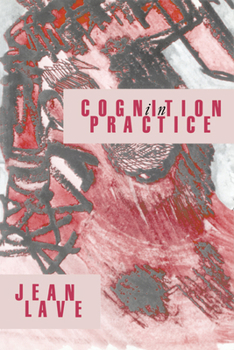Cognition in Practice: Mind, Mathematics and Culture in Everyday Life
Select Format
Select Condition 
Book Overview
In this innovative study, Jean Lave moves the analysis of one particular form of cognitive activity--arithmetic problem-solving--out of the laboratory and into the domain of everyday life. In so doing, she shows how mathematics in the real world, such as that entailed in grocery shopping or dieting, is, like all thinking, shaped by the dynamic encounter between the culturally-endowed mind and its total context, a subtle interaction that shapes both the human subject and the world within which it acts.
Format:Paperback
Language:English
ISBN:0521357349
ISBN13:9780521357340
Release Date:July 1988
Publisher:Cambridge University Press
Length:232 Pages
Weight:0.78 lbs.
Dimensions:0.6" x 6.2" x 9.0"
Customer Reviews
2 ratings
Studying Cognitive Ecologies
Published by Thriftbooks.com User , 18 years ago
I dislike writing a review as a reaction to another reviewer's comments but given that only two reviews are featured for Cognition in Practice and given that one of those reviews is so far off the mark, I figured I had better help to balance the equation. Lave's book is an important piece of work that has greatly benefited cognitive science and anthropology. Her critiques of the cognitive anthropology done up to that point (1988) are usually apt and enlightening. The driving focus of the text is to situate cognition in practice, that is, to study aspects of human cognition as they exist in real-world settings. Lave believes that a transition to such real-world studies will not only provide fresh data about cognition but will also help to shift the dominant epistemology, which favors dichotomies and dualisms, to one that can better appreciate the deep and constant interaction between human beings and their environments. The copy of Cognition in Practice that I have read is from a university library. Given the abundance of margin notes (in multiple languages), stars, exclamation points, and underlinings, I presume the book has been as stimulating to others as it has been to me. Why the one-star reviewer so unreasonably bashed this book and how he come to vilify it as a piece of "lit-crit" is beyond me. There is virtually nothing about Lave's text which would suggest it to be literary criticism, not that that field (or continental philosophy, for that matter) should be uniformly criticized the way the one-star reviewer implies it should. For readers interested in engaging the literature on distributed cognition, practice theory, situated learning, and cognitive anthropology, this book is an essential piece of the puzzle. For additional and complementary insights, I would suggest reading Hutchins's Cognition in the Wild as an accompaniment that illustrates later versions of studying cognition in practice.
Respecifying Cognition
Published by Thriftbooks.com User , 19 years ago
Many readers are introduced to Jean Lave's work through Situated Learning (1991) with Etienne Wenger. However, readers interested in the genesis of Lave's two decade long effort to critique a reified understanding of cognition created in the narrow confines of a sterile experimental room by situating the study of learning within the everyday activities of social life may find Cognition in Practice (and also Everyday Cognition (1985) with Barbara Rogoff) insightful. Though the cognitive sciences themselves have moved on from the `information processing' or `transmission' model of learning that is an artifact of the experimental method and a 1960s fascination with the computer, this model of cognition remains endemic in formal educational today and particularly in educational policy decisions such as the No Child Left Behind Act that reveal a belief in the infallibility of science, so Lave's critique remains relevant today, two decades after the book was written. However, Cognition in Practice aims not merely at critique but at developing a new framework for thinking about cognition - respecifying a `psychological theory of cognition' as an `anthropological' one - and the book is divided into two sections to address each. This endeavor of theory creation does make the book a cumbersome, though not difficult, read at times. The greatest challenge, Lave notes, is involved in depopulating reified meanings of the vocabulary of cognition that we no longer question and respecifying them in specific social/anthropological terms. Lave, in Cognition in Practice, makes the effort to address such dualities as theory/practice and mind/body, revaluing the latter concepts with respect to learning (cognition/learning is another such duality). Yes, two decades later, this is no longer groundbreaking. Though Cognition in Practice is derived from anthropological ethnographic fieldwork and is therefore empirically-based criticism, it shares many of the goals if not the particular focus of literary critical theory. Indeed, in the two decades since the book was written, the lines have been blurred between what Gee (2000) identifies as more than 20 research programs within the great `social turn' in the social sciences and humanities, as ideas and methodologies have cross-populated within critical communities of practice - Gee's (1999) own "Big D" Discourse is Lave and Wenger's (1991) `Communities of Practice,' for example. Cognition in Practice lays the groundwork for Situated Learning (1991), and though the latter is probably more familiar to readers and the concepts more refined (e.g. "whole persons acting in social worlds" becomes "legitimate peripheral participation"), readers interested in the cognitive basis for sociocultural theories of cognition that place learning as an activity located not exclusively in the brain but socially constructed in interaction with others and artifacts in everyday contexts will find Cognition in Practice useful.






